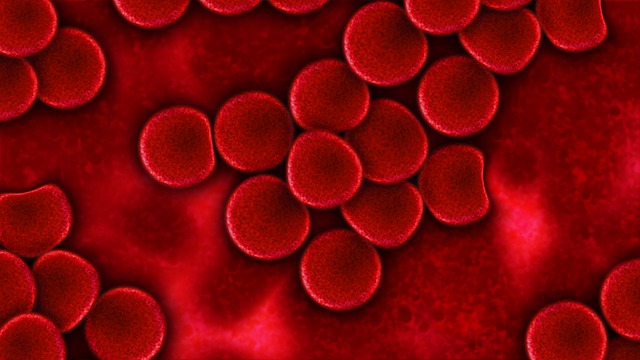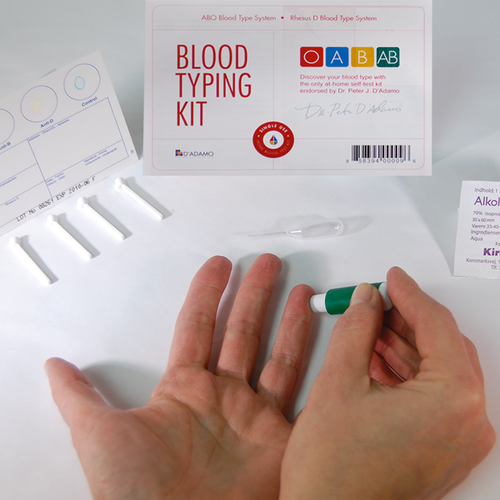Blood Type and Your Health |
|
Do you think knowing your blood type is only important in the event of a transfusion? Think again! Research indicates that your blood type is a key genetic factor that influences many areas of health and well-being.
Throughout your life, you've probably observed that some people tend to lose weight more easily, while for others, their weight is an ongoing battle. Or wondered why some people are plagued by chronic illness while others stay healthy and vital well into their advanced years. Very simply, the answer is in your blood type. Knowing your blood type is an important tool for understanding how your body reacts to food, your susceptibility to disease, your natural reaction to stress, and so much more. A single drop of blood contains a biochemical makeup as unique to you as your fingerprint. 
Below are five facts about your blood type that could change your life: Your blood type may predict your susceptibility for certain diseases. Research has found that individuals of certain blood types may be at a higher risk for certain diseases; studies have found that people with blood type O have a lower risk for heart disease, but a higher risk for developing stomach ulcers. People who are blood type A have higher risks of microbial infections, but Type A women experience a higher rate of fertility. Other research has found that people with type AB and B blood have a much higher risk of developing pancreatic cancer. People of different blood types react differently to stress. Type A people naturally have higher levels of the stress hormone cortisol in their bodies and produce more in response to stressful situations. On the other hand, people with type O blood, have a 'fight or flight' reaction to stress which results in the overproduction of adrenaline. It takes type O's longer to recover from stress because it is more difficult for them to clear the adrenaline from their bodies. Your blood type antigens are not just in your blood! They are everywhere in your body, particularly in the surfaces that interact with the environment. These include your digestive tract, from your mouth to your large intestine, as well as your nasal passages and lungs. Because these blood type antigens are everywhere, they influence how your body reacts to the food you eat through several factors. For example: the lectins in certain foods bind to your blood type antigen and cause your blood to agglutinate (stick together), resulting in feelings of fatigue, headaches, digestive issues, skin problems and a host of other health issues. Gut bacteria is related to blood type. People of different blood types have different gut bacteria, in fact, certain bacteria are 50,000 more likely to turn up in people with one blood type or the other. This originated from our ancestors whose digestive tracts developed to accommodate one type of diet over another. For example, the microbiome of certain people developed to break down carbohydrates much more efficiently (blood type A). People lacking this ability (blood type O) tend to store carbs as fat. A one-size-fits-all approach to nutrition does not work. Food fads come and go, but the facts are clear: everyone does not have the same basic nutritional needs. We all know someone who is a strict vegetarian and thrives on that diet, while others swear by Atkins or similar low-carb plans. I've found that your nutritional needs can be determined by your blood type. Take a look at the food lists in Eat Right 4 Your Type; they are a guide for choosing the foods that will allow you to lose weight, reduce inflammation, increase energy and lead a longer, healthier life. As you've learned, your blood type affects more than just the type of blood you'd need in the event of a transfusion – your blood type is a genetic factor that plays many roles in the human body. Choosing low-lectin, non-agglutinating foods that create a hospitable environment for your good' intestinal flora and selecting foods that combat your disease risks are two good first steps in creating an individualized nutritional program just for you. Parts Excerpted From: mindbodygreen.com One of the hallmarks of alternative medicine is the recognition of the biochemical uniqueness of each individual and the need to tailor treatments and prescriptions to match that individual variability. While a person's genetic code, ultimately, is the basis of this individuality, basing treatments on genetic factors is too broad an approach and not consistent with alternative medicine. According to naturopathic physician Peter J. D'Adamo, N.D., in his book Eat Right 4 Your Type, the missing link might be the four basic blood types: O, A, B, and AB. "There had to be a reason why there were so many paradoxes in dietary studies and disease survival," why some people lose weight and others do not on the same diet or why some people keep their vitality as they age, and others do not, says Dr. D'Adamo. His research into anthropology, medical history, and genetics led him to conclude that blood type is "the key that unlocks the door to the mysteries of health, disease, longevity, physical vitality, and emotional strength." Dr. D'Adamo explains that the practical application of the blood type "key" is that it enables you to make informed choices about your dietary, exercise, supplement, and even medical treatment plans. With the blood type "road map," these plans can now "correspond to your exact biological profile" and "the dynamic natural forces within your own body." Type O-People with type O blood fare best on intense physical exercise and animal proteins and less well on dairy products and grains, says Dr. D'Adamo. The leading reason for weight gain among Type O's is the gluten found in wheat products and, to a lesser extent, lentils, corn, kidney beans, and cabbage, Dr. D'Adamo explains. Ideal exercises for Type O's include aerobics, martial arts, contact sports, and running. Type A-Those with blood type A, however, are more naturally suited to a vegetarian diet and foods that are fresh, pure, and organic. As Type A's are predisposed to heart disease, cancer, and diabetes, "I can't emphasize how critical this dietary adjustment can be to the sensitive immune system of Type A," says Dr. D'Adamo. Type A's can derive significant benefit from calming, centering exercise, such as yoga and tai chi. Type B-Type B's have a robust immune system and a tolerant digestive system and tend to resist many of the severe chronic degenerative illnesses, or at least survive them better than the other blood types. Type B's do best with moderate physical exercise requiring mental balance, such as hiking, cycling, tennis, and swimming. Type AB-Blood type AB, the most recent, in terms of evolution, of the four groups and an amalgam of types A and B, is the most biologically complex. For this group, a combination of the exercises for types A and B works best, says Dr. D'Adamo. Blood type, with its digestive and immune specificity, is a window on a person's probable susceptibility to or power over disease, according to Dr. D'Adamo. For example, Type O's are the most likely to suffer from asthma, hay fever, and other allergies, while Type B's have a high allergy threshold, and will react allergically only if they eat the wrong foods. Type B's are also especially susceptible to autoimmune disorders, such as chronic fatigue, lupus, and multiple sclerosis. Type AB's tend to have the fewest problems with allergies, while heart disease, cancer, and anemia are medical risks for them. With arthritis, Type O's, again, are the predominant sufferers because their immune systems are "environmentally intolerant," especially to foods such as grains and potatoes which can produce inflammatory reactions in their joints, says Dr. D'Adamo. Types A and B are the most susceptible to diabetes, while types A and AB have an overall higher rate of cancer and poorer survival odds than the other types. Lectins and Blood Type A chemical reaction occurs between your blood and the foods you eat. This reaction is part of your genetic inheritance. It is amazing but true that today, in the twenty first century, your immune and digestive systems still maintain favoritism for foods that your blood type ancestors ate. We know this because of a factor called lectins. Lectins, abundant and diverse proteins found in foods, have agglutinating properties that affect your blood and the lining of your digestive tract. Lectins are a powerful way for organisms in nature to attach themselves to other organisms in nature. Lots of germs, and even our own immune systems, use this super glue to their benefit. For example, cells in our liver's bile ducts have lectins on their surfaces to help snatch up bacteria and parasites. Bacteria and other microbes have lectins on their surfaces as well, which work rather like suction cups, so that they can attach to the slippery mucosal linings of the body. Often the lectins used by viruses or bacteria can be blood type specific, making them a stickier pest for people of that blood type. So, too, with the lectins in food. Simply put, when you eat a food containing protein lectins that are incompatible with your blood type antigen, the lectins target an organ or bodily system (kidneys, liver, gut, stomach, etc.) and can begin to interact with the tissues in that area. While you cannot change your blood type, you can use knowledge about its nature to implement a dietary plan biologically suited to your makeup, says Dr. D'Adamo, who supplies copious details on eating plans for all four types. "Most of my patients experience some results [within two weeks of starting the diet plan]-increased energy, weight loss, a lessening of digestive complaints, and improvement of chronic conditions such as asthma, headaches, and heartburn."
Reviewed and revised on: 01/12/2023

|
The statements made on our websites have not been evaluated by the FDA (U.S. Food & Drug Administration).
Our products and services are not intended to diagnose, cure or prevent any disease. If a condition persists, please contact your physician.
Copyright © 2015-2023, Hoop-A-Joop, LLC, Inc. All Rights Reserved. Log In



